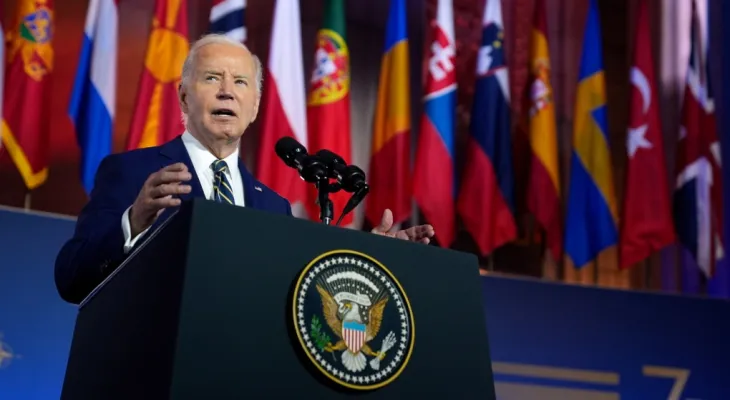Search here
Newspaper
Search here

Arab Canada News
News

Published: July 10, 2024
President Joe Biden strongly defended his foreign policy achievements during his presidency when he welcomed NATO member nations to the Washington summit on Tuesday, closely watched by allies at home and abroad for signs that the embattled American president is still capable of leading.
Biden, 81, faced 12 days of frantic questions about his fitness for office, as some of his Democratic colleagues on Capitol Hill and campaign donors fear he may lose the November 5th elections following a poor performance in the debate on June 27th.
Biden, referring to Russian President Putin, said, "Putin wants nothing less than the complete submission of Ukraine... and to erase Ukraine from the map, and Ukraine can stop Putin and will do so."
The White House hopes to turn the page on speculation with a speech in which he spoke with a strong and confident voice, avoiding any verbal gaffes or signs of confusion that marked his debate performance.
Biden has rejected calls to step down in his race against Republican Donald Trump, 78, pledging to win in November. So far, he still enjoys the support of most of his party's elite.
The American president has made the restoration of traditional American alliances abroad the centerpiece of his foreign policy after Trump challenged allies under an "America First" approach.
The winner in November could have a significant impact on the future of NATO, Europe, and the rest of the world.
Trump suggested that in his second term, he would not defend NATO members if they were attacked militarily and failed to meet the alliance's defense spending target of 2 percent of their GDP. He also questioned the extent of assistance provided to Ukraine in its fight against the Russian invasion.
The main focus of the NATO summit was expected to be new commitments to provide military and humanitarian assistance to Ukraine, as well as a pathway for that war-torn nation to join the 32-member alliance.
Zelensky is fighting for more
Ukrainian President Volodymyr Zelensky arrived in Washington on Tuesday and said he would "fight" for NATO to enhance Ukraine's air defenses and provide more F-16 fighter jets, a request that Washington seems poised to respond to.
He said in a video posted on social media, "We are fighting for additional security guarantees for Ukraine, which include weapons, funding, and political support."
National Security Advisor Jake Sullivan confirmed that NATO would announce a new military leadership in Germany to train and equip Ukrainian forces and appoint a senior representative in Kyiv to deepen relations. U.S. Secretary of State Antony Blinken stated that the summit would "strengthen" Ukraine's path toward NATO membership.
NATO Secretary General Jens Stoltenberg told defense industry leaders in Washington that leaders would commit to empowering weapon manufacturers across Europe and North America to produce more.
He also added that NATO has requested to purchase Stinger missiles worth approximately $700 million in the name of several member countries.
There has been increasing demand for shoulder-fired Stinger missiles in Ukraine, which have successfully halted Russian attacks from the air, and in neighboring European countries that fear they may also need to fend off Russian forces.
Zelensky is set to meet Biden at the White House on Thursday and delivered a speech on Tuesday evening. After rejecting calls from some of his Democratic colleagues for Biden to step down, the White House hopes to refocus on his ability to govern normally.
Assistants have said that his opening speech at NATO will highlight what his administration sees as a key achievement: a stronger, more united NATO under Washington's leadership, with more members and a commitment to meeting their collective security needs.
They say this brings tangible results for American voters: a safer nation, a strong international economic standing, more alliances and power abroad, and less risk of conflict with adversaries.
Trump and many of his Republican allies reject such arguments.
Biden's staying power?
NATO, which is celebrating its 75th anniversary, has found a new purpose in opposing Putin's invasion of Ukraine, and the brutal war will dominate closed-door discussions among world leaders.
These leaders, already concerned about the prospect of Trump returning to Washington and Biden remaining in power, according to diplomats from their countries. One described Biden as politically bruised after a difficult political period, stating that their government was looking for indicators of whether he would remain politically viable.
Biden will hold a rare solo press conference on Thursday aimed at calming concerns.
NATO leaders are facing political uncertainty in Europe, with paralysis looming in France after gains by far-left and far-right parties and a weakened coalition for German Chancellor Olaf Scholz following a poor performance in the European Parliament elections.
New British Prime Minister Keir Starmer, on his way to his first NATO summit, stated he would fulfill his campaign pledge to increase UK defense spending to 2.5 percent of GDP but emphasized it would only happen when the country could afford it and after a long review of defense strategy.
Ukraine ultimately wants to join NATO to avoid further future attacks from Russia, but candidates must receive approval from all alliance members, some of whom fear provoking a direct conflict with Russia.
Some members want to make clear that Ukraine is moving toward NATO "irreversibly" and are eager to use language in the summit's statement that goes beyond last year's general pledge that "Ukraine's future lies in NATO."
A senior NATO official stated on Tuesday that Russia lacks the ammunition and forces needed to launch a large-scale offensive in Ukraine and needs to secure substantial supplies of ammunition from other countries beyond what it already has.
However, he estimated that Russia would be able to sustain its war economy for another three to four years and also noted that "it will take some time" before Ukraine gathers the ammunition and personnel it needs to conduct large-scale offensive operations.
Comments